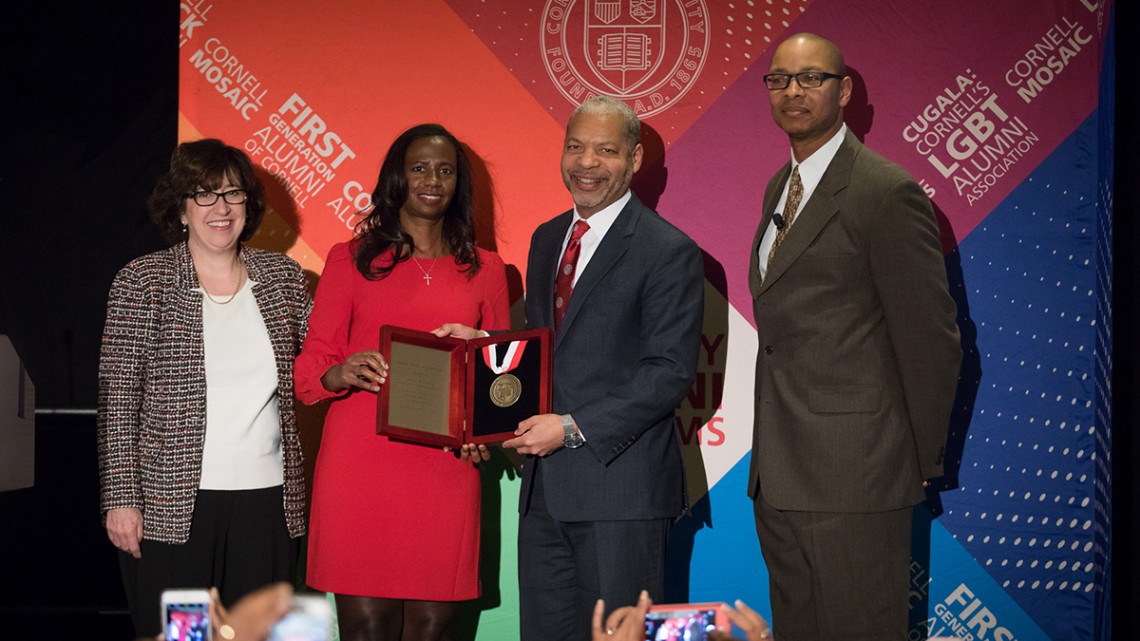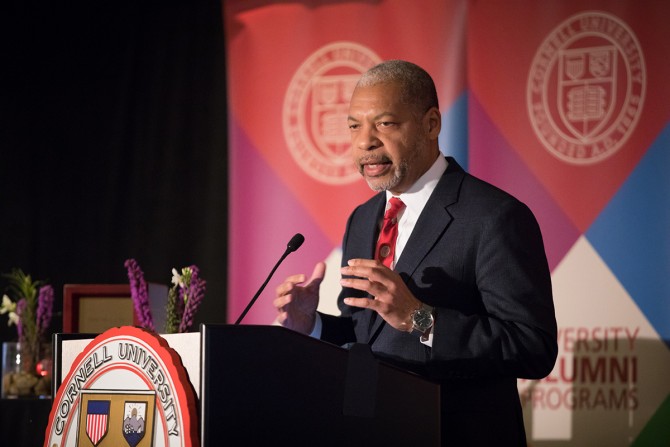
From left, President Martha Pollack; Laura Wilkinson, MBA ’85, J.D. ’86, trustee and chair of the Cornell Mosaic steering committee; Lance Collins, the Joseph Silbert Dean of Engineering; and Mark Lewis, senior associate dean for diversity and faculty development at Cornell Engineering, at the ceremony honoring Collins with the Mosaic Medal of Distinction.
Lance Collins receives inaugural Mosaic Medal of Distinction
By Syl Kacapyr
Lance R. Collins, the Joseph Silbert Dean of Engineering at Cornell, was presented with the inaugural Mosaic Medal of Distinction on Saturday, Nov. 18, during a luncheon in Washington, D.C., hosted by Cornell Mosaic, the Cornell Black Alumni Association and Cornell Engineering.
The medal recognizes Cornell faculty members, administrators and alumni for their impact and leadership on creating opportunities for diverse communities, and was established by Cornell Mosaic, an organization of Cornell alumni and friends created in 2006 to increase the number of diverse alumni engaged with the university.
Speaking at the luncheon, Cornell President Martha Pollack called Collins “an inspired choice” as the first recipient of the award.
“Thanks to him, the College of Engineering is known … not only for being one of the greatest engineering colleges in the country and in the world, but also for its strong support of diversity initiatives, things that I believe go together,” said Pollack.
Under Collins’ leadership, the college has accelerated its efforts to diversify its faculty and student body. Since 2007, Cornell Engineering more than doubled the proportion of underrepresented minority students from 7 to 19 percent. Over the same period, undergraduate female enrollment increased from 28 to 47 percent, more than twice the national average. And the Class of 2021 is the first in the college’s history to contain more women than men (51 percent female).
Others speaking at the luncheon pointed to Collins’ emphasis on the retention and success of those students. Since 2010, the average GPA grew by 8.6 percent among underrepresented minorities, according to Mark Lewis, senior associate dean for diversity and faculty development at Cornell Engineering. He also noted that half of the students currently in the college’s Sloan Diversity Fellowship Program – designed to increase diversity among doctoral students – have earned prestigious Graduate Research Fellowships from the National Science Foundation.
Jordan Fuller ’19 was among the students who thanked Collins at the luncheon. She described feeling doubtful about her ability to be a leader among Cornell’s talented engineering students, but said the inclusive and team-oriented environment she found as a member of the Cornell ChemE Car student project team gave her the confidence she needed.
“It was through working toward this communal goal that I realized I finally had found a community at Cornell,” said Fuller. “Looking now, three years later, this girl who didn’t even know if she belonged at Cornell is now the team lead of a project team.”
Accepting the medal in front of a group that included friends and family, Collins said he was “a representative of dozens of people working on diversity initiatives who deserve credit, too,” naming Jami Joyner, director of Diversity Programs in Engineering; Scott Campbell, director of engineering admissions; and a number of people that he described as his mentors.
Collins said diversity was at the top of his agenda when he started as dean, but it has also been a part of his personal journey as an African-American studying engineering. By “accident of birth,” Collins said he was lucky to be attending college at a time when Ivy League universities began to experiment with diversity initiatives. As a result, he went from graduating from “an undistinguished high school in Long Island” in the late 1970s to becoming only the second African-American to graduate with a chemical engineering degree from Princeton University. He then became the first African-American to receive a Ph.D. from the University of Pennsylvania’s School of Engineering and Applied Sciences.
“Then I went to Penn State and it was a similar thing, and of course at Cornell, not surprisingly, you’re talking to the first black dean,” said Collins to the applause of attendees.
He concluded his remarks by thanking Cornell Mosaic and called receiving the medal “an incredible honor. Literally a pinnacle in my career. It’s really something that I will treasure for the rest of my life.”
Media Contact
Get Cornell news delivered right to your inbox.
Subscribe
